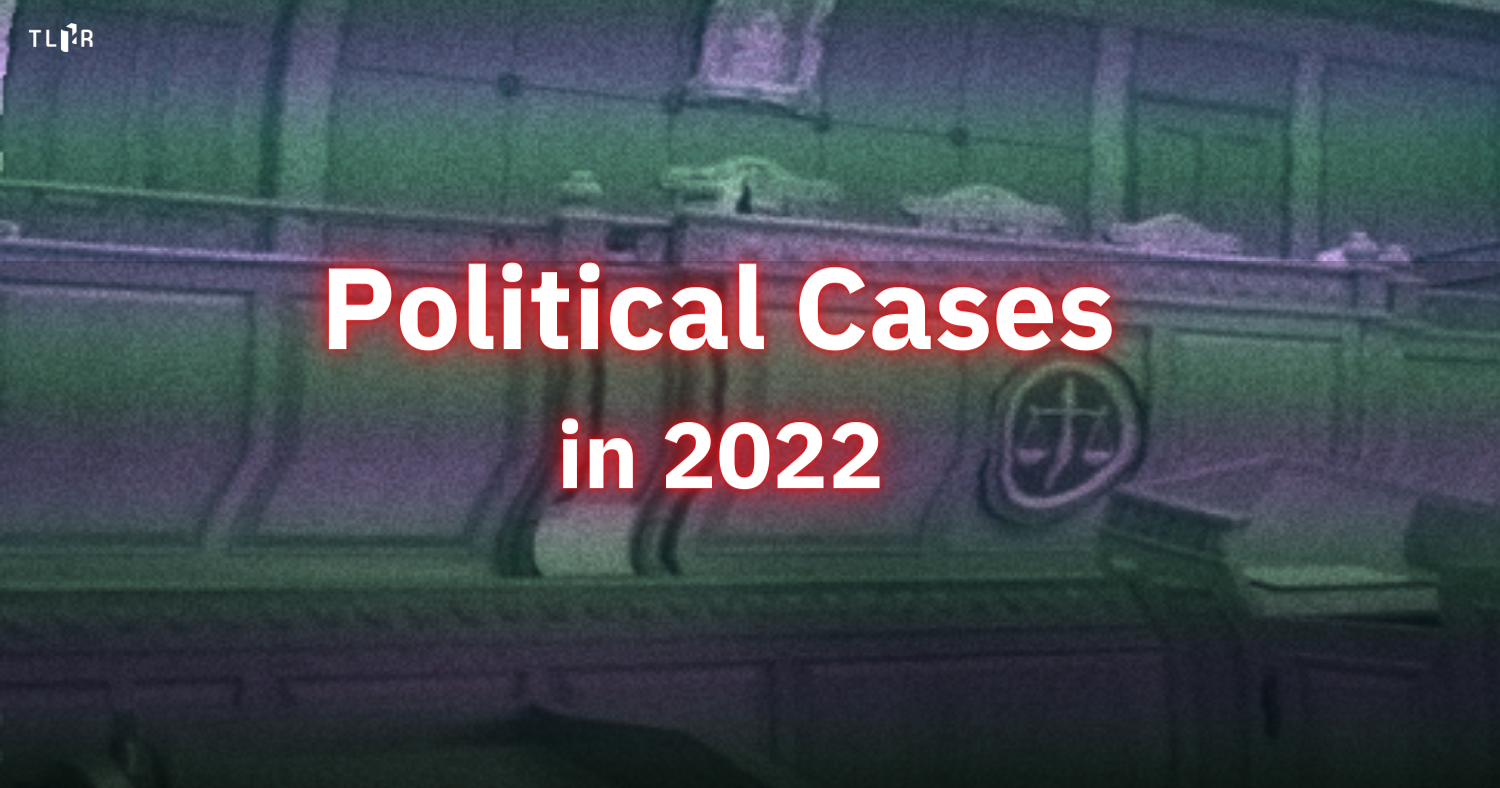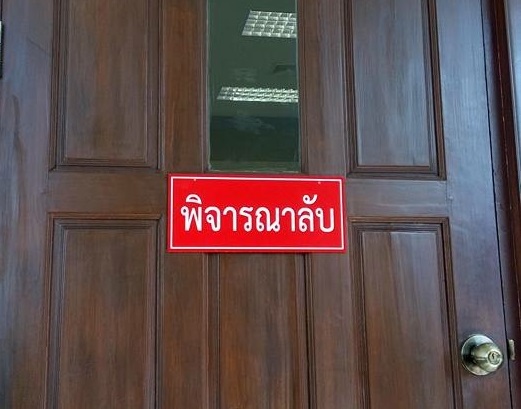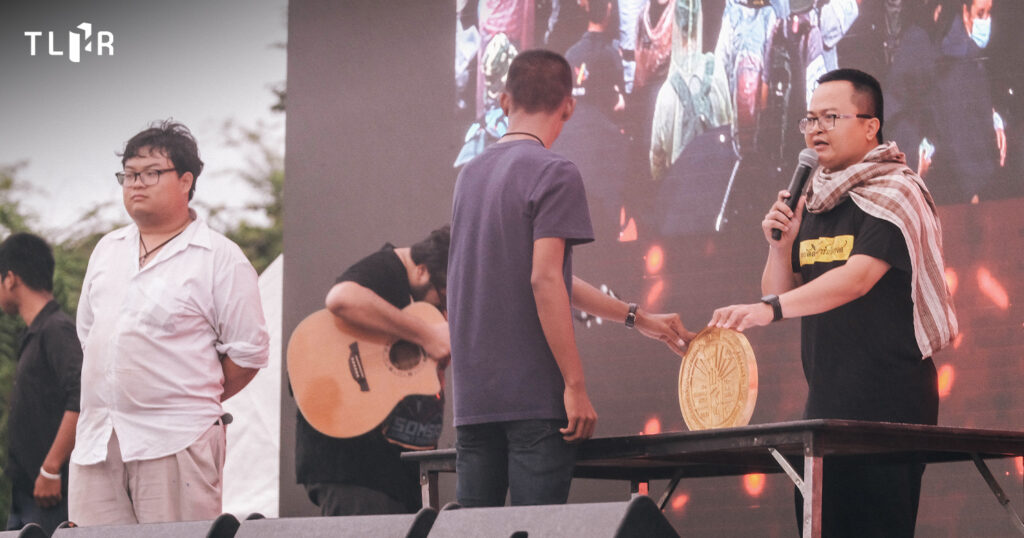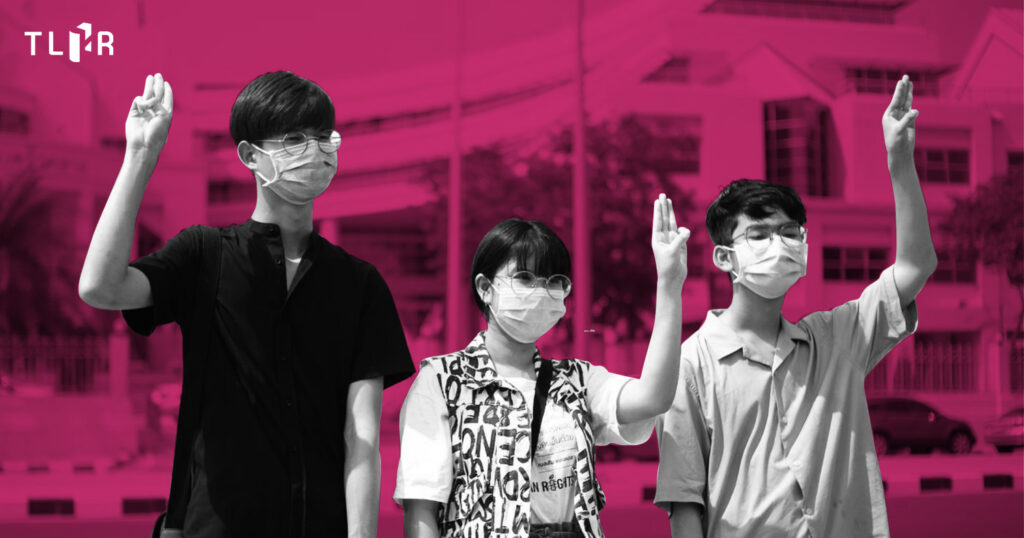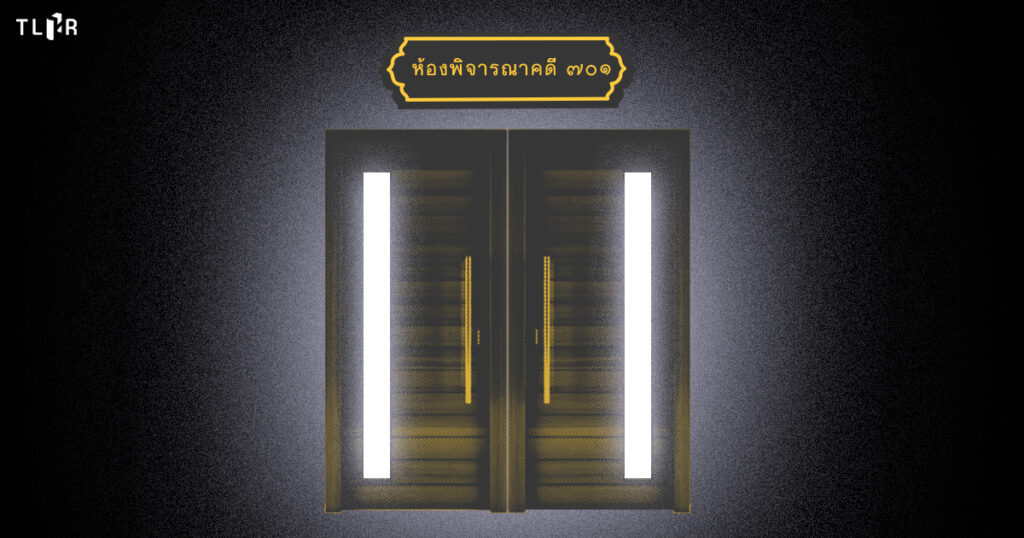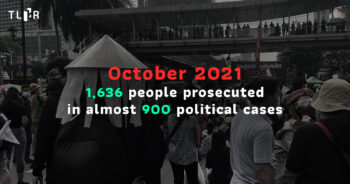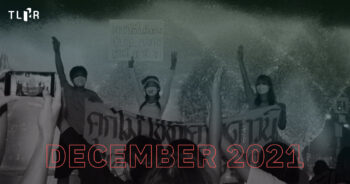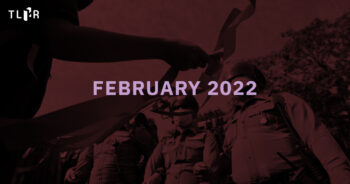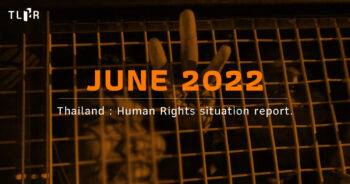In 2022, political prosecutions, deriving from political assembly and expression, remain intense. Particularly, cases initiated in 2020-2021 have been indicted, and as such, witness examinations and presentation of evidence by the defense go on constantly in court trials nationwide.
In addition to the issue of the right to bail during the ongoing defense, as well as the issue of court orders and rulings that made the justice process questionable, there are other important elements during trials that indicate an issue in ensuring the right to a fair trial, which is a fundamental right in the judicial process that everyone should have.
The TLHR has been monitoring the ongoing defense in various trials. While there are problems related to each individual case, contents of the defense, as well as court rulings in which we have previously reported, we have also found many other problems in 2022. The courts have ordered closed trials in lèse-majesté cases, limited a number of people in trial observations, prohibited notetaking during trials, whittled a number of witnesses, decided not to issue subpoenas or request for documents/evidence, as well as prohibited the defense lawyers from making copies of the plaintiff’s evidence to prepare for the defense.
Lèse-majesté Cases: 3 Cases Heard in Closed Trials/ Number of People Limited in Trial Observations
Between January to June 2022, there were at least 3 lèse-majesté cases that were heard in closed trials. Only the parties are allowed to participate in the hearing. Relatives of the defendants, observers or outsiders are not permitted to attend the hearing.
The first case is the case of Sirapat who was accused of stealing the picture of King Rama X as well as the frame, which were erected in front of Prachachuen Village, and dumping the frame into a canal. He was charged with lèse-majesté, violating the curfew, and stealing. The Nonthaburi court ordered a close trial as recommended by the public prosecutor, citing Section 177 of the Criminal Procedural Code.
The court processed the case of Sirapat together with the case of Kanokwan who was charged with the possession of stolen item as she received and kept the picture of King Rama X. Her case will therefore be heard in close trial as well.
As for the second and third cases, these are the cases of “Bas” Monkhol, an activist from Chiang Rai who was charged with lèse-majesté for posting at least 27 Facebook posts. The court also ordered the cases to be conducted in closed trials, citing Section 177 of the Criminal Procedural Code. His parents as well as observers who have travelled to the province could not observe in the trials.
There is another lèse-majesté case which has started since the NCPO Era, which is the case of “Bubpa”, a psychiatric patient. Since her case was transferred from the military court to Pattaya Provincial Court, the court also consistently tried her in closed trial. Even during the ruling hearing at the court of first instance as well as the appeal hearing in March 2022, the closed trial label has been placed in front of the court. Her relatives as well as observers could not observe in the hearings.
While in some other lèse-majesté cases, the court did not order the closed trial, but limited a number of people in the hearings, citing covid prevention measures. This is the case for Mint, an activist from Nattasin Reform Group, in which the Thonburi Criminal Court scheduled a hearing on her bail request. Additionally, an academic who travelled to the Songkla Provincial Court to observe the witness examination of the case of “Menu” Supicha was not allowed in the court room.
As for the two lèse-majesté cases of “Sainam”, the court did not allow diplomats from various countries to observe the trials, citing privacy and safety of the defendant who is a youth. The court allowed only relevant individuals including her parents to attend, even though Sainam stated to the court that she consented to other persons observing the trials.
>>> Read further on issues related to the closed trial: 112 cases and the justice in secret
Lèse-majesté Cases: Court Whittled Witness List and Did Not Issue Subpoenas for Witnesses and Evidence
Another important issue related to the lèse-majesté cases, which affects the right to a fair trial, is that the court did not issue subpoenas for witnesses/evidence as requested by the defense or ordered the defense to whittle the witness list.
In the political assembly case of #19SeptemberRatsadonTakeBackThePower, the court did not subpoena evidence as requested by the defense. These include documents related to the case when the Ministry of Finance had filed a lawsuit against King Rama VII, documents related to the budget of the Crown Property Bureau, and documents related to the travels of King Rama X. The court stated that it is unclear whether these documents are relevant to the case, even though the defense insisted that they are needed during the cross examinations. Following several postponements, the court recently subpoenaed only the documents related to the lawsuit against King Rama VII.
In the lèse-majesté case of “Narin”, during the witness examination, the criminal court ordered both the plaintiff and the defendant sides to whittle the witness lists. Thus, the defendant decided not to testify because he thinks he will not receive any justice, since the court denied all witnesses who are academics from testifying. Moreover, the court scheduled the ruling hearing within 3 days after the witness examination, which is considered very quick and unusual from other trials.
The same thing happened in the cases of “Beam” and “Petch”, two youths who were charged after participating in the #WearingCropTopAt Paragon. The Juvenile Court did not allow witnesses who are academics and legal practitioners from both the plaintiff and the defendant sides from testifying. The court stated that it will conduct the legal judgement itself.
Additionally, the same pattern took place at the witness examinations in lèse-majesté cases. Particularly when the defense wanted to examine issues related to the royal powers, royal behaviours, as well as economic and political roles of the royal institution, the court wouldn’t allow the witness examination on these issues. This is true for the case of Anon Nampa, “Mind” Passarawalee Thanakijwiboonpol, and Hong Tae where the courts ordered the defense to whittle the witness list, citing irrelevance.
In the case of Talks During Khan Mak Parade which took place in front of Bang Kaen Police Station on 21 December 2020, in which Anon Nampa, Prit Chiwarak, and Chinnawat Chankrachang are defendants, the Criminal Court whittled 14 witnesses from the list. The defense requested for these witnesses as they could testify on issues related to the royal powers and stock transfer. Based on the record of the trial procedure, it was recorded that the examination of these witnesses could cause damages to the royal institution. Moreover, there are no legal provisions or exemption for truth or good faith as defenses to the offence of lese-majeste or royal defamation. And it is not directly relevant to the case.
Due to these issues, the defendants in lèse-majesté trials are facing limitations with regards to their defense. This is especially for those who were charged after publicly discussing information related to the royal institution, as the issues related to the royal institution could not be raised and reflected during the witness examination.
The Court Barred Defense Lawyer from Making Copies of Plaintiff’s Evidence and Court Procedure Report, Thereby Denying the Right of the Defendant
Another issue that infringes upon the right to a fair trial is when the court does not allow the defense to make copies of plaintiff’s evidence or court procedure report. So far in 2022, there are at least 3 cases that are facing this issue.
In the political assembly case #RehearsalAgainstTheCoupMob or #27NovWeGoToLatPhraoIntersectionMoB, which took place on 27 November 2020, we found that prior to the scheduling of witness examination, the defense attorney had requested discovery filed by the public prosecutor, including CDs and flash drives, in order to prepare for the defense. However, the court denied the request, stating that by disclosing discovery prior to conducting witness examination, the disclosure will cause the plaintiff to be at a disadvantage in the defense of the case.
Such as order is in contravention to fair trial principles as well as Section 8(4) of the Criminal Procedural Code which states that the defendant has the right to examine discovery, make copies, or take photos of such discovery.
As for the case of 3 youth leaders from Bad Student Movement who were charged following the protest on 15 October 2020, the Central Juvenile Court did not allow the defense attorney to make copies of discovery filed by the public prosecutor. The court reasoned that Section 173/2 of the Criminal Procedural Code allows the parties to check discovery, and that it did not allow the parties to make copies of discovery. However, after the defense attorney argued to the court and prepared to appeal the said order, the court finally allowed the defense to make copies of discovery. changed the order to allow the casting.
For the lèse-majesté case of Teerawat, Simutprakarn Provincial Court did not allow the defense attorney to make copies of the court procedure report, citing there is no policy to allow copying. Although the attorney made a complaint online, the system states that the trial is on-going for many months, and thus not possible to make a copy of the report.
11 Cases – Observers Barred from Notetaking during Court Hearings
The incidents where the court barred observers or outsiders from observing the trials as well as notetaking occur periodically, even though there is no legal or court requirement that officially prohibits notetaking. There is only a prohibition of recording videos/voices, and therefore, notetaking should not be interpreted as something that causes disturbances or affects the trial.
During the first half of 2022, there are 11 political assembly/expression cases in which it was reported that the courts barred observers from taking notes (7 lèse-majesté cases, 2 cases related to the violations of the Emergency Decree related cases, 1 case related to the violations of the Public Assembly Act, and 1 case related to violations of the Flag Act.
As for the pattern or the prohibitions, it was usually done verbally by the judges, without this being recorded in the court procedure report, except for the case of Sainam who was tried in the Juvenile Court. In her case, there was an official court order, prohibiting the video recording as well as the distribution of images and voices.
Nevertheless, in many cases, judges verbally told observers not to take notes after the witness examinations have been conducted for a while, sometimes even after 1-2 days. In some cases, there was no indication of clear rationale, while in some other cases, the court stated that a permission must be requested prior, or that the defense may request for a copy of court record instead of taking own notes, or that if the note is distributed, it may contain discrepancies. There was one case that the court’s official notetaker and the court’s police barred the notetaking, not the judge.
11 cases where notetaking was barred include: lèse-majesté cases of Narin, Sombat Thongyoi, Meechai, Tiwakorn, Udom, as well as the case of 3 students in Chiang Mai, the case of Raising the Flag for Monarchy Reform, the case of #IsaanWillnotTolerate Protest, the case of #15April2021 Protest, and the case of SwitchingOffTheSenator.
The prohibition of notetaking, without existing legal or court requirements, affects the open and transparent of the trials. Allowing trial observation is an element of fair trial principles.
>>> Revisit the prohibition of notetaking in military trials during NCPO era: No Notetaking, No Distribution: Military Courts’ Actions Contrary to the Principles of Transparent Trial and Democratic Principles
>>> Read iLaw Report: British and US Courts Underscore the Right to Notetaking in Court Trials.
